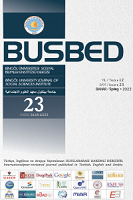TALİBAN’IN TOPLUMSAL GERÇEKLİĞİNİN KURUCU ZEMİNİ: “BİZ” VE “ÖTEKİ” OLUŞUMU
THE FOUNDING GROUND OF THE TALIBAN'S SOCIAL REALITY: THE FORMATION OF “US” AND “OTHER”
Author(s): Canan Katilmiş, Mehmet Emin GüvenSubject(s): Regional Geography, Politics and religion, Politics and society, Culture and social structure , Social Norms / Social Control, Politics and Identity
Published by: Bingöl Üniversitesi Sosyal Bilimler Enstitüsü
Keywords: The Taliban; Us; The other; The legitimacy ground;
Summary/Abstract: The distinction of "us and the other" used in explaining political and social debates of the 20th century has revealed a new consciousness of us and the other with the construction of the modern state, which points to the necessity of homogeneity. This consciousness has been built with a national security approach that will keep its citizens inside and foreigners out against all threats trying to enter its territory without permission. This understanding of national security did not only determine the boundaries of the areas containing the Western geography and Western values. At the same time, this situation has resulted in each state, each different political, social and cultural thought creating its borders and determining the area of what is normal and abnormal for itself, as it builds an immanent understanding of the political, social and cultural. Acting with the consciousness of "us" based on blood, kinship and cultural identity, the Taliban gained legitimacy by preserving its existence from those who tried to enter their lands without permission, the "unjust and illegitimate" one, the other. In Afghanistan, which is weak in terms of the existence and functionality of political and democratic institutions but has unity in terms of social identity construction, the Taliban gained its social reality through the opposition of "us and the other". In this direction, the study aims to reveal the elements that make up the "us" and the "other" for the Taliban and also make the Taliban legitimate in Afghanistan. In the study, the elements that reveal religious radicalism, as well as the Taliban; political environment, social reasons, religious-political goals, individual situation and philosophical reasons, were evaluated under five headings. Historical and descriptive research methods were used in the study.
Journal: Bingöl Üniversitesi Sosyal Bilimler Enstitüsü Dergisi (BUSBED)
- Issue Year: 12/2022
- Issue No: 23
- Page Range: 107-120
- Page Count: 14
- Language: Turkish

